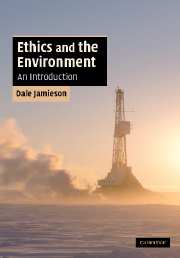1 - The environment as an ethical question
Published online by Cambridge University Press: 05 June 2012
Summary
Nature and the environment
What is the environment? In one sense the answer is obvious. The environment is those special places that we are concerned to protect: the Arctic National Wildlife Refuge in Alaska, the Great Barrier Reef in Australia, the Lake District in Great Britain. But the environment is more than these special places. It is also Harlem and Brixton, as well as the Upper East Side of Manhattan and the leafy suburbs of Melbourne. It is even the strip malls of Southern California. The environment includes not just the natural environment, but also the built environment.
Indeed, we can even speak of the “social environment.” The term ‘environmentalism’ was coined in 1923, to refer not to the activities of John Muir and the Sierra Club, but to the idea that human behavior is largely a product of the social and physical conditions in which a person lives and develops. This view arose in opposition to the idea that a person's behavior is primarily determined by his or her biological endowment. These environmentalists championed the “nurture” side in the “nature versus nurture” debate that raged in the social sciences for much of the twentieth century. They advocated changing people by changing society, rather than changing society by changing people.
While the scope of the environment is very broad, contemporary environmentalists are especially concerned to protect nature. Often the ideas of nature and the environment are treated as if they were equivalent, but they have quite different origins and histories.
- Type
- Chapter
- Information
- Ethics and the EnvironmentAn Introduction, pp. 1 - 25Publisher: Cambridge University PressPrint publication year: 2008



